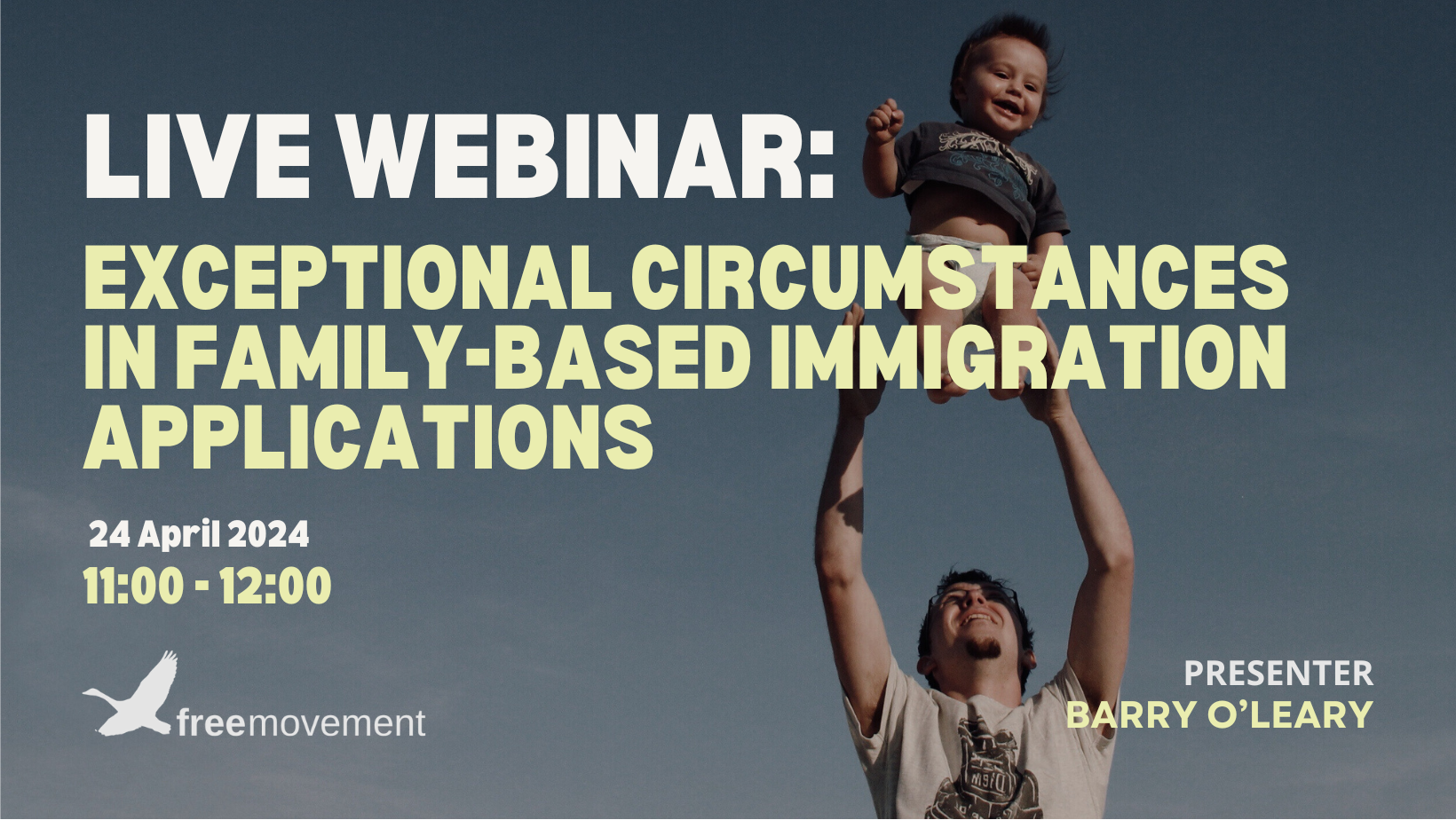- BY Barry O'Leary

How to avoid the minimum income requirement for partners under Appendix FM
“This is a very dark day for many families who will be unable to meet the … new income requirement” commented Sonia on the day the Home Secretary announced that the minimum income requirement for partners under Appendix FM was going to be raised. Her view is shared by many immigration lawyers, bi-national couples and those who simply think that living in the UK with your foreign national partner should not be an option available only to the well-off.
Since the initial announcement, we have learned that the increase will be staggered with the first increase being to £29,000 and will come in spring 2024. The level of £38,700 will be reached in 2025 [Ed: unless we have a new government by then, who rightfully decide to abandon these increases]. Cold comfort to many who will seek to apply in the future.
We do not yet have the draft immigration rules that will make the increase law but it is important to start thinking now about how couples can avoid the new minimum income requirement.
Below we look at the various ways that applications can be made while avoiding the need to meet the minimum income requirement. We have covered much of this previously and have linked to other useful Free Movement articles but consider this a useful and timely reminder of these alternatives, which will need to be used on a much larger scale than previously.
Apply before spring 2024
We have been told that the new minimum income requirement will be introduced in spring 2024, though we do not know the exact date. We know that applications made before the rule change will be decided on the basis of the current minimum income requirement. If the current minimum income requirement applied in the initial application, that will be requirement that applies in applications for further and indefinite leave. It may seem obvious but if a couple meets the requirement now but will not do so in the future, they should look to submit an application before the rule change.
It is important to remember that the date of application is the date that the online application form is submitted. As Alex explained in an earlier Free Movement article in relation to beating the immigration health surcharge increase, there is a natural delay between the application being submitted and the applicant being required to provide their supporting documentation at a biometric appointment. Applicants do not need to be worried if their biometric appointment takes place after the threshold increases so long as they have submitted their application form before the change.
However, the applicant needs to ensure that they meet the existing financial requirement at the date of submission. If they are relying upon employment or cash savings over a six-month period, for example, that needs to have been completed before submitting the online form.
Remember paragraph EX.1

Currently the relevant requirements are set out in Appendix FM and Appendix FM-SE to the immigration rules. Paragraph EX.1 of Appendix FM creates an exception for in-country leave to remain applications only. Its first limb allows for an exception to be made where there is a British citizen child or a child who has lived in the UK for seven years and it would not be reasonable for that child to have to leave the UK. Its second limb allows for an exception to be made where there are insurmountable obstacles to the family life continuing in another country. See Gabriella’s Free Movement article that deals with this in detail.
Use exceptional circumstances under paragraph GEN to broaden sources that can be used to meet the financial requirement
Paragraph GEN 3.1 of Appendix FM can be used by those applying out of country as well as in-country. This does not avoid the minimum income requirement but it allows for a wider range of sources (set out at paragraph 21A(2) of Appendix FM-SE) to be used in meeting the requirement if there are exceptional circumstances which could render a refusal a breach of article 8 of the European Convention on Human Rights.
GEN 3.2 is broader and allows for a grant of leave if a refusal would result in a breach of article 8 of the European Convention on Human Rights. Both GEN 3.1 and 3.2 are also discussed in Gabriella’s Free Movement article.
Exemption where sponsoring partner in receipt of certain welfare benefits
If the sponsoring partner is in receipt of certain welfare benefits, then the test is not the minimum income requirement but whether there is adequate maintenance and accommodation without recourse to public funds. This is a very different test which involves an assessment of whether the family would have more than the equivalent British family reliant upon income support. This is usually a substantially lower threshold than the new financial requirement. See Jack’s earlier Free Movement article for more details on this.
The importance of strong initial applications
Exceptional applications made under Appendix FM are always fact-specific and it is not enough to simply quote the law at length and make assertions. Such applications need good supporting evidence. That may be relatively straightforward if you are relying on the existence of a British citizen child (though you still need to deal with the issue of unreasonableness). However, if, for example you are asserting there are insurmountable obstacles, then a great deal of work may be needed to show why there very significant difficulties if the couple were to live in the applicant’s country of origin.
For example, if making applications for those who meet all the rules save for the financial requirement, we might consider setting out in detail (where appropriate, and with supporting evidence) why that couple will not need recourse to public funds even though they do not meet the minimum income requirement. By doing so, we may weaken any public policy argument.
If the necessary work is put in, couples will hopefully have a successful decision without litigation. However, even if strong applications are refused and couples are being kept apart unjustifiably, this may be important in future litigation.
There is no absolute right for British citizens (or settled persons or those with pre-settled status) to have their foreign partners live with them in the UK. Article 8 of the European Convention on Human Rights permits the state to interfere with family life if the interference is proportionate. In the inevitable future litigation in the tribunal and higher courts, the Home Secretary will undoubtedly seek to argue that their position is justifiable on public policy grounds and that the rules are human rights compliant. They will state that migrants should not be a ‘burden’ on the state and point to the exceptions in the rules to assert that these are adequate to meet human rights concerns.
Of course, we know that such a high figure cannot be justified on public policy grounds and the Home Secretary has a poor record in fairly applying their own human rights exceptions, especially for those applying from abroad. However, we need the cases that go before the tribunals and courts to show this. We need cases to be well-argued and well-evidenced from the beginning. We will need to show that the Secretary of State makes harsh decisions even on well-evidenced, meritorious applications and that there are no public policy grounds for those refusals.
Conclusion
We must use the tools available to enable families to be together even if they cannot meet the minimum income requirement. It is also important to remember that though the new minimum income requirement is simply unfair, we will diminish our chances of defeating it in litigation in the future if we do not start with strong applications.
SHARE

